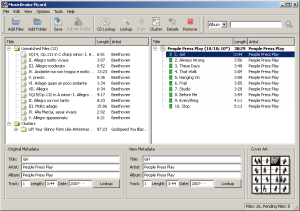MusicBrainz Picard: Difference between revisions
From MusicBrainz Wiki
Jump to navigationJump to search
(Fix dud link (Imported from MoinMoin)) |
((Imported from MoinMoin)) |
||
| Line 28: | Line 28: | ||
</ul> |
</ul> |
||
* [[How PUIDs Work|HowPUIDsWork]] |
* [[How PUIDs Work|HowPUIDsWork]] |
||
<ul><li style="list-style-type:none">Explanation of [[Music Analysis|MusicAnalysis]], [[Audio Fingerprint| |
<ul><li style="list-style-type:none">Explanation of [[Music Analysis|MusicAnalysis]], [[Audio Fingerprint|AudioFingerprinting]] and the relationship between Picard, [[MusicBrainz]] and MusicIP. |
||
</ul> |
</ul> |
||
* [[Picard Linux Install|Picard Linux installation]] |
* [[Picard Linux Install|Picard Linux installation]] |
||
Revision as of 15:16, 1 August 2008
Products > Picard
Picard, the Next-Generation MusicBrainz Tagger

|
Picard is the next generation MusicBrainz tagging application. This new tagging concept is album oriented, as opposed to track/file oriented like the ClassicTagger was. Picard is written in Python, which is a cross-platform language, and makes use of cross-platform libraries - this allows the same code to run both on Windows, Linux and Mac OS X.
Download and Use Picard
- Download the latest version of Picard.
- Read the illustrated Picard Tagger Quick Start Guide
- For more information read the Documentation on Picard
- Have a look at the plugins available.
Documentation for Users
These are all the documents that should help users of Picard:
- Video guides on how to use Picard
- Illustrated Picard quick start guide.
- Explanation of MusicAnalysis, AudioFingerprinting and the relationship between Picard, MusicBrainz and MusicIP.
- Guide for tips on how to install Picard from sources on various linux distributions.
- Picard FAQ
- There is also a page covering Picard on Wikipedia.
For Developers
PicardDevelopment groups all available information about the development of Picard.